After completing previous modules, you already have all the basic skills to get started. Remember, practice makes perfect.
I would also introduce some tips and tricks that I learned.
1. Purpose
- Ask yourself about everything. Why am I doing this? Why does this matter? Try to use boxes to keep tack of these whys as you explore your own reasons.
- Example: Why did I take this class?
- Now, go back down and ask how?
- Example: I want to build a class to help people think clearly. How should I make it?
- Possible answer: Don’t rush. Write my script on a notebook instead of computer.
Traverse up and down the how-why ladder is often a good place to start.
2. Quality with Color
I use simple colours, black and white, in my newsletters. However, colour can be immensely powerful.
One good way to use colours is layering on top of drafts. Imagine your are preparing for an online class.
- Write your ideas in black. No holding back.
- When you are done, add colours to the ideas you like best.
It gives you a good two step process where you can be creative without judgement at first, then reflect.
3. Scale
Scale matters in visual notes. Try to play with scale, making some words huge, some small. Hierarchy brings clarity to your notes.
- Try to write a word so small that you can barely read it
- Try to write a word big enough to fill a page
Can you make it bigger so that it exceeds a page?
4. White space
Don’t be afraid of white spaces.
You can give emphasis to a word by making it big. Also, you can do it by giving it more space to breath.
Lastly, try using thought bubbles, speech bubbles to reflect and comment.





